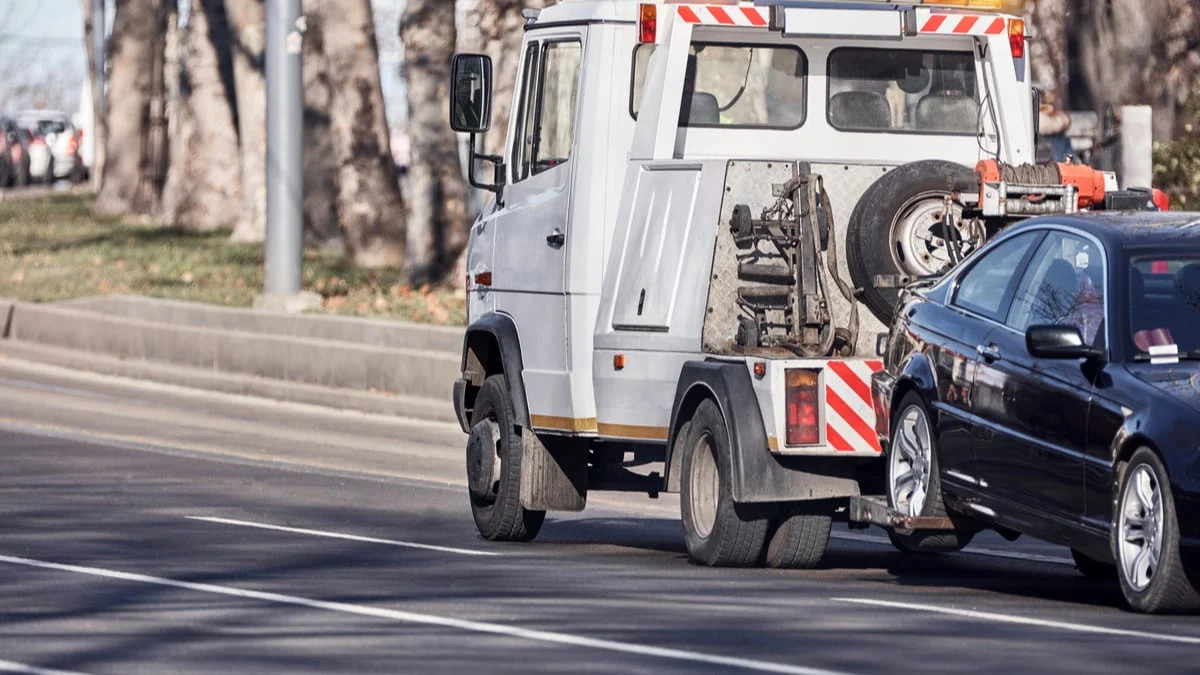Having your rental car towed can be an incredibly stressful and inconvenient experience.
If you walk out of a store or restaurant only to find an empty parking space where you left your rental car, you’re likely wondering what to do next and how to get your vehicle back as quickly as possible.
If you’re short on time, here’s a quick answer to your question:
Confirm the Car Has Been Towed
When you discover that your rental car is missing, the first step is to confirm whether it has been towed or not.
This will help you determine the appropriate actions to take. Here are a few ways to confirm if your rental car has been towed:
Check with the rental company
Reach out to the rental company and inquire about the whereabouts of your car. They may have information regarding any towing incidents or can guide you on the next steps to take.
Provide them with relevant details such as the location and time of the incident.
Contact parking authorities
Get in touch with the local parking authorities or law enforcement agencies to check if your rental car has been towed.
They can provide you with information on recent towing activities in the area and guide you on how to retrieve your vehicle.
Look for tow away signs and check if you were illegally parked
If you suspect that your rental car has been towed, look for tow away signs in the vicinity. These signs usually indicate the conditions under which a vehicle can be legally towed.
If you were parked in violation of any parking regulations, it is likely that your car has been towed.
In such cases, contact the relevant authorities to find out where your car has been taken.
Remember, it is essential to confirm if your rental car has been towed before jumping to conclusions or assuming it has been stolen.
Taking the appropriate steps will help you retrieve your car efficiently and avoid unnecessary stress.
Locate the Towed Vehicle
Discovering that your rental car has been towed can be a frustrating experience. However, it is important to remain calm and take immediate action to retrieve your vehicle.
Here are some steps to help you locate your towed rental car:
1. Call local towing companies
Start by contacting local towing companies in the area where you parked your rental car. They may have information about the location of your vehicle and can provide you with guidance on how to retrieve it.
Be sure to provide them with all the necessary details, such as the make, model, and license plate number of the rental car.
2. Rental car company should know towing company destination
Reach out to the rental car company from which you rented the vehicle. They should have information about the towing company that relocated your car.
Rental car companies often have established relationships with towing companies in the area, and they can help you determine where your car has been towed.
3. Check online towing databases
There are online databases available that can help you locate your towed rental car. These databases provide information about towing companies and their storage lots.
By inputting the necessary details of your rental car, such as the license plate number, you can find out which towing company has your vehicle and where it is being held.
It is important to note that fees may apply for retrieving your towed rental car, and these fees are typically your responsibility.
Be sure to have proper identification, such as your driver’s license and rental agreement, when picking up your vehicle from the towing company’s storage lot.
Remember, it is always a good idea to familiarize yourself with the local parking regulations and restrictions before parking your rental car. This can help you avoid the inconvenience and expense of having your vehicle towed.
Pay Fines and Fees to Retrieve the Car
Fees may include towing fee, impound fee, parking ticket
If your rental car gets towed, it’s important to be aware that there will likely be fines and fees associated with retrieving it. These fees may include a towing fee, an impound fee, and any outstanding parking tickets.
The exact amount of these fees will vary depending on the location and the specific circumstances of the towing.
For example, the towing fee is typically charged by the towing company for their services in removing and impounding the vehicle.
This fee can range anywhere from $50 to $200 or more. Additionally, there may be an impound fee charged by the impound lot where the car is being held.
This fee is usually a daily charge for storing the vehicle and can vary depending on the impound lot’s policies.
In some cases, there may also be outstanding parking tickets associated with the towed vehicle. These tickets will need to be paid in order to retrieve the car.
It’s important to check with the local municipality or parking authority to determine if there are any outstanding tickets and how they can be paid.
Make sure to get receipts for reimbursement
When paying the fines and fees to retrieve your towed rental car, it’s important to make sure you obtain receipts for reimbursement.
Some rental car companies may have policies in place that allow you to submit these receipts for reimbursement.
Make sure to check with your rental car company to see if this is an option.
Having receipts can also be useful for insurance purposes. If you have rental car insurance or if your personal auto insurance covers rental cars, you may be able to file a claim to be reimbursed for the fines and fees associated with the towing.
Again, it’s important to check with your insurance provider to understand their specific policies and requirements.
Remember, the process of retrieving a towed rental car can be frustrating and time-consuming, but by promptly paying the fines and fees and keeping track of your receipts, you can minimize any additional stress and potentially seek reimbursement for the expenses incurred.

Coordinate Logistics for Picking Up the Car
When your rental car gets towed, it’s important to coordinate the logistics for picking it up. Here are some steps you can take to ensure a smooth process:
Confirm you have valid driver’s license and other required documentation
Before heading to the impound lot, double-check that you have all the necessary documentation. This typically includes a valid driver’s license, proof of insurance, and any additional paperwork provided by the rental car company.
Having these documents ready will save you time and frustration when picking up the car.
Arrange transportation to the towing impound lot
Once you’ve confirmed your documentation, you’ll need to arrange transportation to the impound lot. If you have access to a car, you can drive yourself.
However, if you don’t have a vehicle or the impound lot is far away, you may need to consider alternative transportation options such as a taxi, rideshare service, or public transportation.
Ask about after-hours retrieval if needed
If your rental car gets towed outside of regular business hours, it’s important to inquire about after-hours retrieval options.
Some impound lots have specific procedures in place for retrieving vehicles outside of normal operating hours.
By asking about this beforehand, you can ensure that you have a plan in case you need to pick up your rental car outside of regular business hours.
Reimbursement and Coverage Considerations
Review rental agreement terms about towing policies
When renting a car, it is crucial to carefully review the terms and conditions of the rental agreement. One aspect to pay extra attention to is the towing policy. Familiarize yourself with the rules and regulations regarding towing fees and reimbursements.
Some rental companies may provide coverage for towing expenses, while others may not. Understanding these policies beforehand can save you from unexpected expenses and help you navigate the situation in a more informed manner.
Credit card coverage may help reimburse costs
If your rental car gets towed, it is worth checking if your credit card offers any coverage for these situations. Many credit cards provide benefits like rental car insurance, which can include coverage for towing expenses.
Contact your credit card provider to inquire about their specific policies and requirements for reimbursement.
Keep in mind that some credit cards may require you to decline the rental company’s insurance coverage in order to be eligible for reimbursement.
Work with rental company on next steps for reimbursement
After your rental car has been towed, it is important to contact the rental company as soon as possible. Inform them about the situation and inquire about their reimbursement process.
They will guide you through the necessary steps and provide you with the required documentation.
Be sure to gather all the relevant information, such as receipts, tow truck company details, and any other documentation the rental company may require for reimbursement.
Following their instructions and providing the necessary documentation promptly will help expedite the reimbursement process.
It is worth noting that each rental company may have different procedures and requirements for reimbursement. Therefore, it is crucial to communicate with them directly and follow their guidelines to ensure a smooth reimbursement process.
Preventing Rental Car Towing Incidents
Carefully check all parking signs and meters
When renting a car, it’s crucial to be vigilant about parking regulations to prevent your rental car from being towed.
Always make sure to carefully check all parking signs and meters before leaving your vehicle unattended.
Pay attention to any time restrictions, permit requirements, or prohibited parking zones indicated on the signs. Ignoring these signs can lead to your rental car being towed, resulting in unnecessary stress and expenses.
Don’t park in unauthorized areas
To avoid the risk of your rental car being towed, make sure to park only in authorized areas.
It may be tempting to park in a spot that seems convenient or close to your destination, but if it’s not a designated parking spot, you run the risk of your car being towed.
It’s always better to take a few extra minutes to find a legal parking spot rather than face the inconvenience and cost of retrieving your towed rental car.
Get parking app alerts and extensions to avoid expired meters
Expired parking meters can be a common reason for rental cars getting towed. To prevent this from happening, consider using parking apps that provide real-time alerts and allow you to extend your parking time remotely.
These apps can help you stay informed about the status of your parking meter and ensure that you never exceed the time limit.
By utilizing these tools, you’ll minimize the chances of your rental car being towed due to an expired meter.
Remember, being proactive and cautious about parking regulations can save you from the hassle and expense of dealing with a towed rental car.
Always double-check parking signs and meters, park in authorized areas, and use parking apps to stay on top of your parking time.
By following these simple steps, you can enjoy a stress-free rental car experience without the worry of your vehicle being towed.
Conclusion
Getting your rental car towed can completely derail your travel plans. While the experience is frustrating, acting quickly and knowing the proper steps to take can help get you back on the road again as smoothly as possible.
Being aware of parking restrictions, promptly contacting the rental company, paying any fines, and submitting paperwork for potential reimbursement will allow you to resume your rental and trip.
The most important things are confirming the tow, locating the vehicle, paying any fees, and picking it up from the tow yard.
With the right information and preparation, you can minimize headaches and wasted time if your rental car gets towed unexpectedly.






